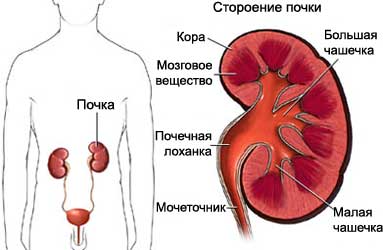Berger's disease – IgA nephropathy
Description of IgA nephropathy
IgA nephropathy is a kidney disease. With this disorder kidney can not filter the waste. Immunoglobulin protein A (IgA) accumulates inside the filter (glomeruli) kidney. When this happens, glomeruli can not filter waste and excess water from the blood.
This is a potentially dangerous disease, which requires a reference to the doctor. The sooner treatment begins IgA nephropathy, the more favorable outcome.
Twenty-five percent of people with IgA nephropathy develop end-stage renal disease. End-stage renal failure is a serious disease. It arises, when the kidneys are unable to perform their normal functions. If you suspect the presence of IgA nephropathy, you need to seek medical advice immediately.

Causes of IgA nephropathy
Not yet known, It is causing IgA nephropathy, but it is supposed, her appearance may play a role genetics. It seems, Some people are predisposed to the disease.
Risk factors IgA nephropathy
Factors, which increase the likelihood of developing IgA nephropathy:
- Family history of IgA nephropathy or purpura Shenleyna-Genoa (inflammation of the blood vessels in the skin and other organs of the body);
- Paul: men are more likely to develop the disease;
- Age: by the end of adolescence to the end of 30 years;
- High blood pressure;
- High cholesterol.
Symptoms Berger
In the early stages of the disease often has no symptoms IgA nephropathy. In the later stages symptoms may include:
- Blood and urine protein;
- Swelling of the hands and feet;
- Frequent upper respiratory infections;
- Intestinal diseases;
- High blood pressure;
- High cholesterol;
- Fatigue;
- Muscle aches;
- Fever.
Diagnosis of the disease Berger
The doctor will ask about your symptoms and medical history, and perform a physical examination. Tests may include the following:
- Analysis of urine, to check for blood and protein;
- Blood test;
- Biopsy pochki – removing a tissue sample or cells from the kidney;
- Hemodynamometry;
- Quiz cholesterol.
Treatment of the disease Berger
There is no cure for IgA nephropathy. Your doctor can help prevent the disease or to take measures to alleviate the symptoms, such as high blood pressure. Treatment includes IgA nephropathy:
Medication
Your doctor may suggest taking the following medicines:
- ACE inhibitors – to lower blood pressure and reduce the level of protein in the urine;
- Corticosteroids, to provide relief for inflamed areas of the body.
Changes in diet
The doctor may recommend reducing salt intake and limit the amount of protein in the diet. Limit protein in the diet can be, avoiding meat, dairy products and gluten (gluten). Gluten – protein, which is contained in wheat, Rye, barley and oats.
Control cholesterol
If you have high cholesterol, your doctor may recommend to reduce its. You can do this by making changes in diet and doing exercise. The doctor may also prescribe medication to lower cholesterol.
Fish fat
Some studies show, that fish oil may be beneficial in the treatment of IgA nephropathy.
Tonsillectomy
Some studies have shown, that surgical tonsillectomy with people, IgA nephropathy who are ill and often have an infection in the tonsils, may reduce the amount of protein in blood and urine.
Dialysis
People, who develop renal failure, resulting in IgA nephropathy may need dialysis. Dialysis – procedure that performs the functions of the kidneys in their refusal.
Kidney Transplantation
People, who develop renal failure, resulting in IgA nephropathy, you may need kidney transplant. During a kidney transplant patient and kidney damage is replaced with a healthy kidney donor.
Preventing disease Berger
To reduce the probability of occurrence of IgA nephropathy, Follow these steps::
- Control blood pressure and blood cholesterol:
- Eat a healthy diet low in saturated fat and rich in whole grains, fruits and vegetables;
- Exercise regularly;
- Maintain a healthy weight;
- Do not smoke. If you smoke, try to quit;
- Drink alcohol in moderation is necessary. The maximum dose of alcohol – no more 80 grams per day for men and 50 grams per day for women;
- If necessary, you need to lose weight;
- It is necessary to carry out exercises and meditation to reduce stress;
- Your doctor may prescribe medication, to help reduce blood pressure and / or cholesterol;
- Tell your doctor, if you have a family history of IgA nephropathy or other forms of kidney disease. Thus, the doctor can watch for signs of IgA nephropathy.
